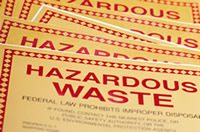Category: Hazardous Waste Management
Hazmat Training Checklist for Compliance
Are you a “hazmat employer,” i.e., anyone who: Uses one or more workers to transport hazardous materials in commerce? Transports hazardous materials in commerce or causes hazardous materials to be transported or shipped in commerce? Manages packaging that is qualified for transporting hazardous materials (e.g., designs, manufactures, fabricates, inspects, marks, certifies, sells, reconditions, repairs, or […]
The Hazmat Employee and Training—Most Misunderstood Regs
The issue of responsibility for training comes up frequently because third parties frequently enter the picture. For example, the hazmat employer may contract an outside firm to provide training to employees. Or the hazmat employer may retain subcontracted employees. Would the training company or the subcontracting company be liable if the training was found to […]
RCRA-Approved BMPs for Your Contaminated Rags
Find a Solvent Alternative Find out if there is an aqueous or semi-aqueous cleaner you can use instead of the solvent. This can eliminate solvent wastes and the toxicity of used shop towels altogether. Consider using solvents that are not chlorinated and have low volatile organic compound emissions; consult material safety data sheet information for […]
To Manifest or Not
Here’s the answer. Manifest procedures for shipments of containers that do not meet the EPA definition of “empty” (as defined in 40 CFR 261.7) are addressed in the federal regulations at 40 CFR 263.21(b) and 40 CFR 264/265.72. Container residues, which are residues that exceed the quantity limitations for an “empty container,” are considered a […]
Counting Your Hazardous Wastes
Generators: How to Tell If You Need an EPA ID Number for Your Hazardous Waste
A Heads Up On the Future of RCRA
They’ve identified forces that might shape a future waste and materials management program and suggested goals and the strategies that might be used to achieve those goals. The stated objective of the work group findings was to stimulate thought and discussion about RCRA’s future without representing any formal federal or state agency policy or promoting […]
RCRA: Who Rules–State or Federal?
What’s Happening with USTs in 2012
Secondary containment requirements for new and replaced tanks and piping Operator training requirements Periodic operation and maintenance requirements for UST systems New release prevention and detection technologies The amendments will also remove certain deferrals; update codes of practice; and update state program approval requirements to incorporate these new changes.







